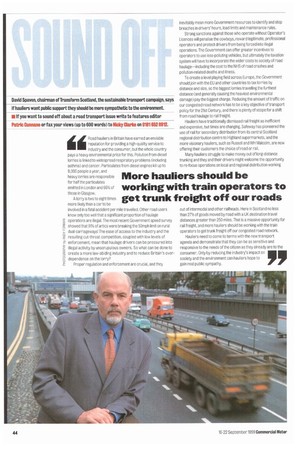David Spaven, chairman of Transform Scotland, the sustainable transport campaign,
Page 48

If you've noticed an error in this article please click here to report it so we can fix it.
says if hauliers want public support they should be more sympathetic to the emironment
• If you want to sound off about a road transport issue write to features editor Patric Cunnane or fax your views (up to 600 words) to Micky Clarke on OW 652 Ot12.
d Road hauliers in Britain have earned an enviable
reputation for providing a high-quality service to industry and the consumer, but the whole country pays a heavy environmental price for this. Pollution from diesel lorries is linked to widespread respiratory problems (including asthma) and cancer. Particulates fro— diesel engines kill up to 9,000 people a year, and heavy lorries are responsible for half the particulates emitted in London and 66% of those in Glasgow.
A lorry is two to eight times more likely than a car to be involved in a fatal accident per mile travelled. Other road users know only too well that a significant proportion of haulage operations are illegal. The most recent Government speed survey showed that 91% of artics were breaking the 50mph limit on rural dual-carriageways! The ease of access to the industry and the resulting cut-throat competition, coupled with low levels of enforcement, mean that haulage drivers can be pressured into illegal activity by unscrupulous owners. So what can be done to create a more law-abiding industry and to reduce Britain's overdependence on the lorry?
Proper regulation and enforcement are crucial, and they inevitably mean more Government resources to identify and stop breaches in drivers' hours, load limits and maintenance rules.
Strong sanctions against those who operate without Operator's Licences will penalise the cowboys, reward legitimate, professional operators and protect drivers from being forced into illegal operations. The Government can offer greater incentives to operators to use less-polluting vehicles, but ultimately the taxation system will have to incorporate the wider costs to society of road haulage—including the cost to the NHS of road crashes and pollution-related deaths and illness.
To create a level playing field across Europe, the Government should join with the EU and other countries to tax lorries by distance and size, so the biggest lorries travelling the furthest distance (and generally causing the heaviest environmental damage) pay the biggest charge. Reducing the amount of traffic on our congested road network has to be a key objective of transport policy for the 21st Century, and there is plenty of scope for a shift from road haulage to rail freight.
Hauliers have traditionally dismissed rail freight as inefficient and expensive, but times are changing. Safeway has pioneered the use of rail for secondary distribution from its central Scotland regional distribution centre to Highland supermarkets, and the more visionary hauliers, such as Russell and Whi Malcolm, are now offering their customers the choice of road or rail.
Many hauliers struggle to make money out of long-distance trunking and they and their drivers might welcome the opportunity to re-focus operations on local and regional distribution working out of intermodal and other railheads. Here in Scotland no less than 27% of goods moved by road with a UK destination travel distances greater than 250 miles. That is a massive opportunity for rail freight, and more hauliers should be working with the train operators to get trunk freight off our congested road network.
Hauliers need to come to terms with the new transport agenda and demonstrate that they can be as sensitive and responsive to the needs of the citizen as they already are to the consumer. Only by reducing the industry's impact on society and the environment can hauliers hope to gain real public sympathy.










































































































